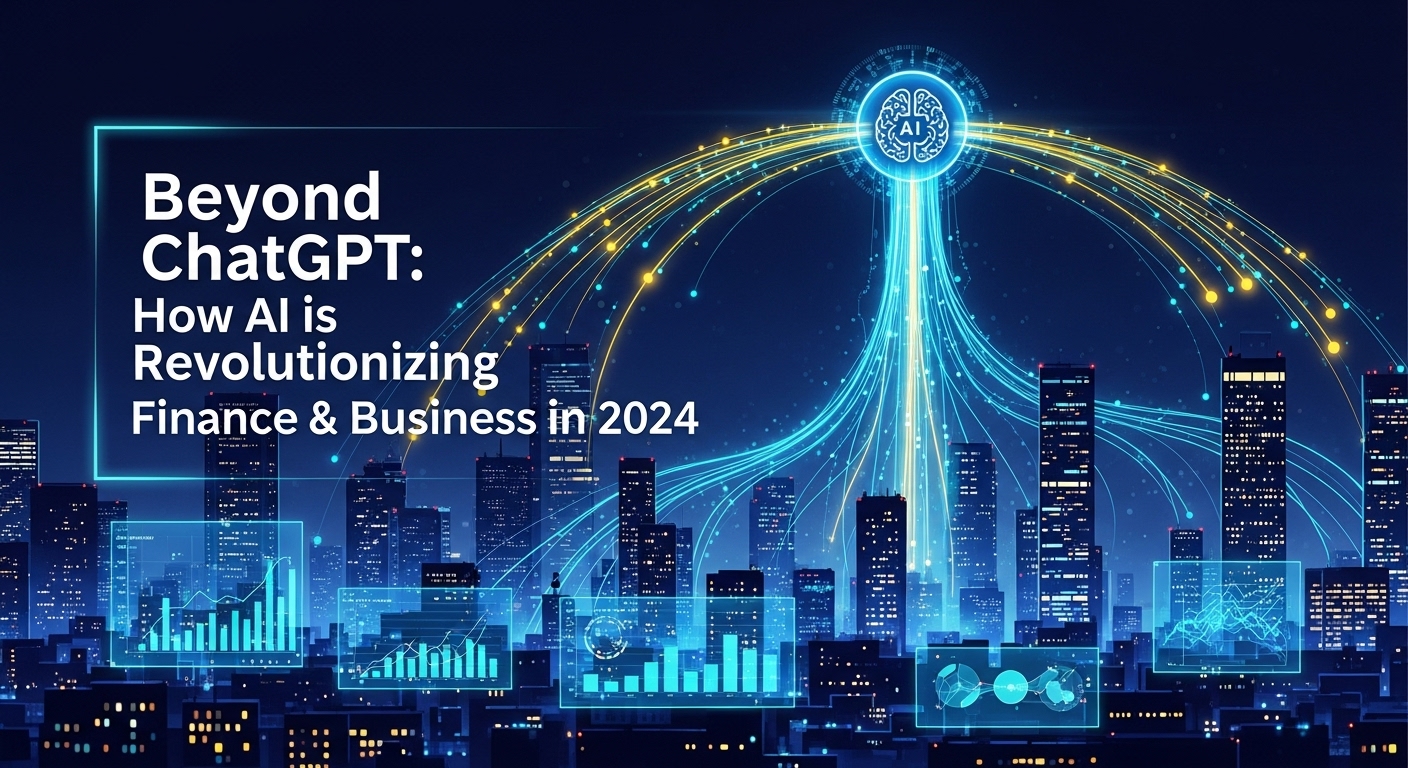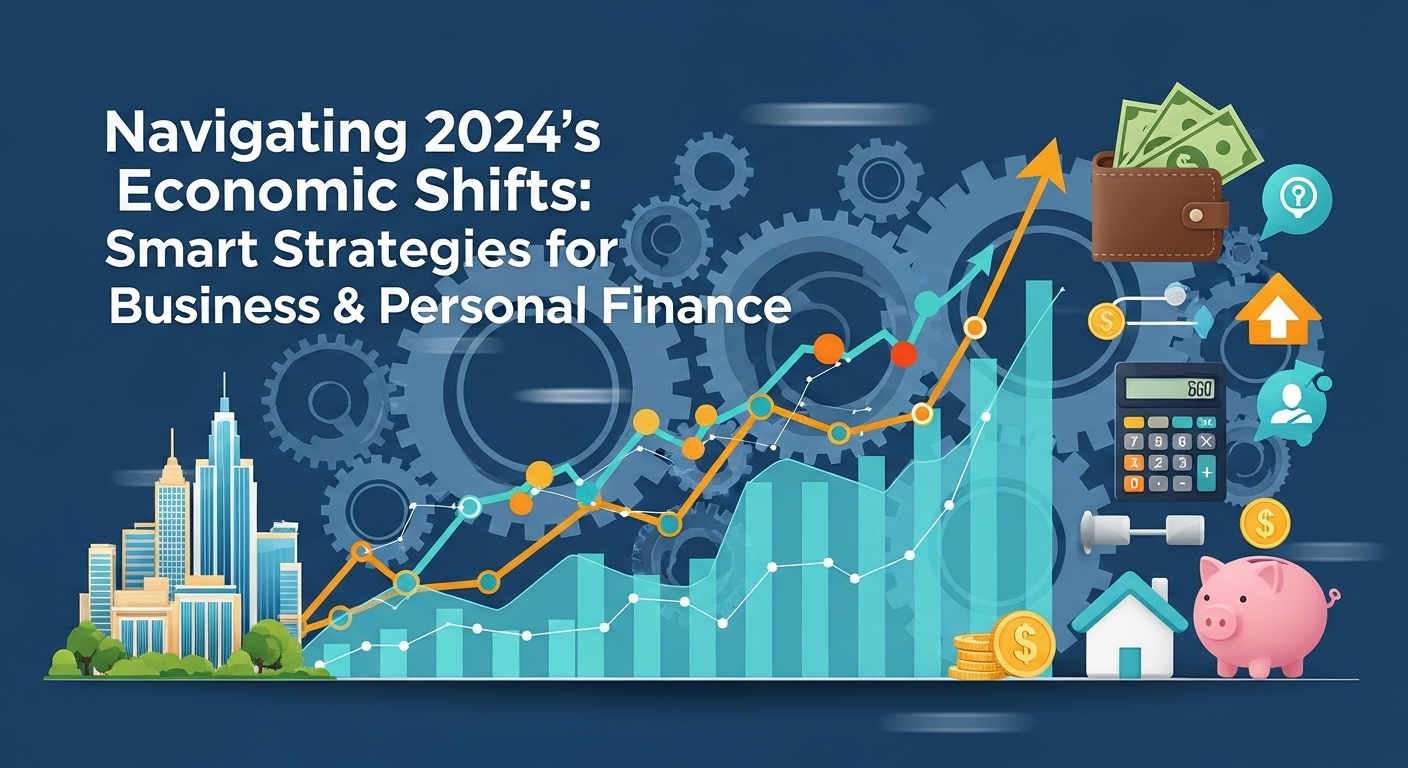The AI Wave Sweeping Through Finance & Business
When you hear “AI” in 2024, your mind probably jumps straight to ChatGPT. It’s understandable. Generative AI has captured the public imagination with its ability to write poetry, debug code, and answer complex questions in seconds. But to think that’s the full picture of AI’s impact is like looking at the tip of an iceberg. Beneath the surface of conversational AI, a much larger, more powerful revolution is quietly and fundamentally reshaping the worlds of finance & business. This transformation goes far beyond creating content; it’s about redefining efficiency, strategy, and value creation itself.
While chatbots are impressive, the real game-changers are the sophisticated algorithms, machine learning models, and predictive analytics engines working behind the scenes. These systems are not just automating tasks; they are providing insights that were previously impossible to uncover, driving decisions with unprecedented accuracy, and creating hyper-personalized experiences for customers. In 2024, AI is no longer a futuristic concept for boardrooms to ponder—it’s a critical, operational tool that is separating the leaders from the laggards in every industry.
AI in Finance: More Than Just Numbers
The financial sector, built on data and risk assessment, has become a fertile ground for AI innovation. The sheer volume and velocity of financial data make it a perfect candidate for machine learning applications that can detect patterns and anomalies invisible to the human eye. The impact is being felt across the board, from Wall Street trading floors to your personal banking app.
Algorithmic Trading and Predictive Analytics
For decades, traders have relied on instinct, research, and basic models. Today, AI has supercharged this process. Algorithmic trading, powered by machine learning, now accounts for a massive portion of market activity. These AI systems can:
- Analyze vast datasets in real-time: AI models sift through market prices, news headlines, social media sentiment, and economic reports simultaneously to predict stock price movements with incredible speed.
- Execute high-frequency trades (HFT): AI can execute millions of orders in fractions of a second, capitalizing on tiny price discrepancies that are impossible for a human trader to catch.
- Develop complex strategies: Machine learning models can identify intricate correlations and build trading strategies that adapt dynamically to changing market conditions, a process known as quantitative analysis.
Enhanced Fraud Detection and Security
Financial fraud is a multi-billion dollar problem. Traditional rule-based systems were often slow and produced a high number of false positives. AI has revolutionized fraud detection by learning and adapting. AI-powered systems monitor transactions in real-time, establishing a baseline of normal behavior for each individual customer. When a transaction deviates from this pattern—like a purchase in a new country or an unusually large withdrawal—the system can instantly flag it for review or block it altogether. This not only saves financial institutions immense sums of money but also protects consumers from theft and enhances trust in the digital banking ecosystem.
Personalized Banking and Robo-Advisors
The days of one-size-fits-all financial products are numbered. AI is enabling a new era of hyper-personalization in banking and wealth management. Robo-advisors use algorithms to create and manage investment portfolios based on an individual’s financial goals, risk tolerance, and timeline, offering sophisticated advice at a fraction of the cost of a human advisor. Banks are also using AI to analyze customer data to offer personalized loan rates, tailored credit card offers, and proactive financial advice through their mobile apps. This creates a stickier, more valuable customer relationship.
Revolutionizing Business Operations with AI
Beyond the specialized world of finance, AI is becoming the new engine of general business operations. It’s the silent partner optimizing supply chains, delighting customers, and freeing up human employees to focus on more strategic, creative work. The applications are vast and growing every day.
Hyper-Personalized Customer Experiences
Companies like Amazon and Netflix have set the standard for personalization, and AI is the technology that makes it possible. In 2024, businesses of all sizes are leveraging AI to understand their customers on a deeper level. AI-driven recommendation engines suggest products you’re likely to love, dynamic pricing models adjust costs based on demand and user behavior, and AI-powered CRM systems can predict customer churn, allowing businesses to intervene with targeted offers before a customer leaves. This isn’t just about better marketing; it’s about building genuine, one-to-one relationships at scale.
Supply Chain Optimization and Logistics
A modern supply chain is a dizzyingly complex web of suppliers, manufacturers, warehouses, and transportation networks. AI is bringing order to this chaos. Machine learning models are now used for highly accurate demand forecasting, reducing the risk of overstocking or stockouts. AI algorithms optimize delivery routes in real-time, considering traffic, weather, and delivery windows to save fuel and time. In warehouses, AI-powered robots manage inventory, picking and packing orders with superhuman speed and accuracy. This end-to-end optimization makes businesses more resilient, efficient, and profitable.
Automated Business Processes and Decision-Making
Many core business functions are being transformed by AI-driven automation. This goes beyond simple robotic process automation (RPA). AI is now being used for:
- Intelligent Document Processing: Extracting and interpreting information from invoices, contracts, and receipts, automating accounts payable and receivable.
- HR and Recruitment: AI tools can screen thousands of resumes to identify the most qualified candidates, reducing bias and saving countless hours.
- Strategic Insights: AI-powered analytics platforms can analyze a company’s performance data and present key insights and recommendations directly to executives, enabling faster, more data-driven strategic decisions.
The Challenges and Ethical Considerations of AI Adoption
Despite the immense potential, the road to AI integration is not without its bumps. Adopting AI presents significant challenges that businesses must navigate carefully. One of the primary concerns is data privacy and security. AI models are hungry for data, and using customer data requires robust governance and transparency to maintain trust and comply with regulations like GDPR. Furthermore, the risk of algorithmic bias is very real. If an AI is trained on biased historical data, it can perpetuate or even amplify that bias in its decisions, leading to unfair outcomes in areas like hiring or loan applications. There’s also the ongoing conversation about job displacement and the need to reskill and upskill the workforce to collaborate with, rather than be replaced by, intelligent systems.
Embrace the AI Revolution or Get Left Behind
The evidence is clear: AI is no longer a niche technology for tech giants and Wall Street quants. It is a foundational force that is fundamentally altering the landscape of finance & business. From securing transactions and personalizing customer journeys to optimizing global supply chains and informing C-suite strategy, its impact is both broad and deep. The conversation has moved far beyond ChatGPT and conversational interfaces. We are in an era of operational AI, where intelligent systems are embedded into the core processes of successful enterprises. Companies that fail to see beyond the hype and begin strategically integrating AI into their operations risk becoming inefficient, uncompetitive, and ultimately, obsolete. The future isn’t coming; it’s already here, running on algorithms. The only question is whether your business is ready to plug in.

